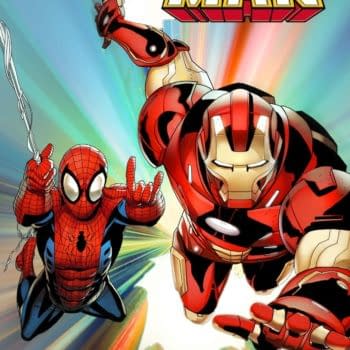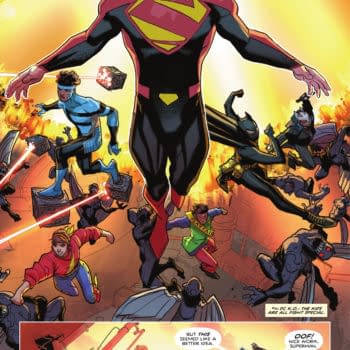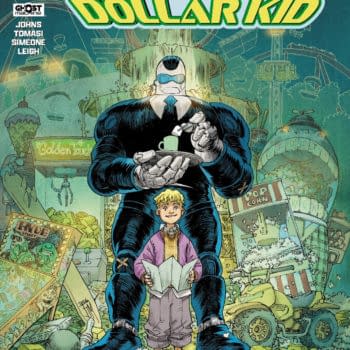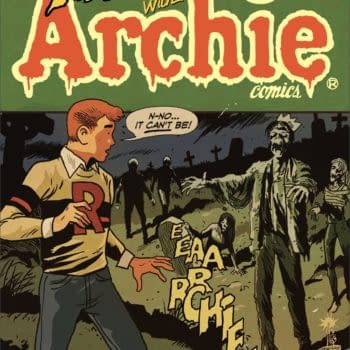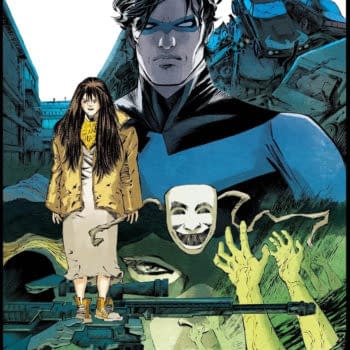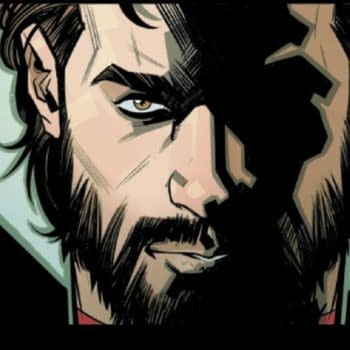Posted in: Comics, Recent Updates | Tagged: becky cloonan, brian wood, Comics, dark horse comics, entertainment, The Complete Demo
Talking With Brian Wood And Becky Cloonan About The Complete Demo – Plus 30 Page Preview
On March 25th, Dark Horse is bringing a new edition to print of the ground-breaking series Demo, written by Brian Wood and illustrated by Becky Cloonan. For many readers, Demo was a first of its kind, perhaps the first to bring a kind of human-textured drama into the comics form for them, the first to blend the idea of superpowers with the idea of tragic human consequences, or simply the first series they read in a variant art style that opened possibilities for the visual development of comics. For Brian Wood, writing Demo reminded him of writing short stories or short films, for Becky Cloonan, it was a seemingly limitless canvas to explore visually. For both, it seems, it was a landmark of collaboration and discovery in storytelling.
Now "The Complete Demo", containing 18 stories, with a total of 450 pages with extras and commentary, is arriving to remind the creators of their milestones, and they are able to reassess, or at least ponder, what kind of impact the series had and how it might be viewed by new readers today.

Both Brian Wood and Becky Cloonan grace Bleeding Cool today to talk about Demo and reflect on such a key element of their joint creative histories:
Hannah Means-Shannon: Brian, How on earth did you come up with such a variety of different stories and casts of characters to use in Demo? Did you find writing these stand-alone tales similar to short story writing at all?
Brian Wood: In a way, yes. At the time I started writing Demo, I was living with someone who directed short films, and as a result, I was watching a lot of short films around the house and thinking a lot about the format. I began to appreciate this idea of telling (in some cases) a one-act story, a small chunk of someone's life that revolved around a key decision, or a point where paths diverge. I wasn't thinking about the comics format at all, which I think was the key.
As far as the characters go, I just took it one month at a time, creating people to find needs and situations and then discarding them when I was done. I had to keep the focus small, just pay attention to one story at a time and not thinking about anything that came next.
HMS: There are similar themes across the stories in Demo and there are unique themes to some particular stories. Was there a particular "tone" you wanted overall to join the stories? If so, how would you describe it?
BW: Well, there's the general sort of superpower tone, but it's a very realistic, very subdued one. There is a strong undercurrent of sadness – I've always liked downbeat stories, tragedies. Youth, coming-of-age, broken relationships. I wasn't looking for any one tone… again, the series was built one story at a time and I didn't want to lock either myself or Becky into any one concept or theme that might get in our way down the road. In retrospect? I feel that Demo is more "Becky and me" than any theme or idea. I love that. It came into play when we were working on Demo 2 – we didn't sweat it, we figured that as long as we stayed true to ourselves, it would end up feeling like Demo no matter what the story was.
HMS: Looking back on the stories now must be quite a trip seeing how many miles you covered as a writer since then. What are you proudest of and what stands out the most as something that signals your growth since then?
BW: Speaking for myself, I'm proud that we took a leap and did something weird and didn't pay attention to any rules. Granted, it was easy at the time since neither of us had a whole lot of experience and the 'rules' of comics hadn't really become ingrained in us like maybe they are now. I'm proud we just went for it.
For me, that was a scary thing about starting Demo 2. By that point I was doing two Vertigo monthly books and was fully indoctrinated in their way of making a comic. Could I manage to forget all that and remember how to write a Demo story? I lay awake at night a few times worrying about that.

BW: Aside from the short film thing, I had done covers for Warren Ellis's Global Frequency, which was a series of connected one-shots, and I liked that. I wanted to try it, and I wanted to push it a little further, to see is 12 UN-connected one-shots could work.
HMS: How did you come to work with Becky and how did her work influence your own over the course of Demo?
BW: Man, I don't know if I can properly answer that in a way that does it justice. I knew Becky already – she had drawn Channel Zero: Jennie One already after I found a bunch of her online comics and emailed her out of the blue. I definitely saw her as a sort of kindred spirit based on some aspects of our shared background and cultural influences, and that's only grown over the years. What would my career be without Becky and without Demo? I can't even imagine.
HMS: Becky, When you look back, how significant do you think Demo was on giving you a chance to explore different style options? Did the stand-alone structure particularly enable that?
Becky Cloonan: At the time, Demo was the biggest project I'd ever been involved with. Twelve issues! When Brian first approached me about it I was so nervous, because all of my experience up to that point had mostly been with short stories, and I was still struggling to find my "style" so to speak. Demo's format totally played to that though, and Brian gave me so much freedom in the art department I kind of just ran wild. Some of it worked, some of it didn't- but hey, that is kind of the beauty of it. A lot of my growth as a storyteller was forged in the fires of this book.
HMS: What was it about the subject matter in Demo that made you want to work on the project?
BC: The stories were always very real, and even just bouncing ideas back and forth I became emotionally invested in the characters, their powers, and their lives. I've always felt like this book was a true collaboration, and Brian was always really cool about anything I brought to the table no matter how far out of left field it was.
HMS: What are some of your strategies for conveying emotions and extreme states in comics effectively?
BC: I'll try to answer this as best I can, but so much of that depends on the situation, the context. That said, I am always paying attention to character, their acting, their emotions and trying to put myself in their shoes. I also play close attention to the environment they are in. I try to get to know the characters as I would a good friend or relative, and try to convey that to the reader. Comic books are all about storytelling, and making the audience feel the way you want them to at any given moment in the story, creating ups and downs, patterns and feelings. I can try to draw as good as I can, but that doesn't mean anything if I can't move you.
HMS: Looking at Demo, which deals extensively with the lives of young people, reminds me that you're currently working on Gotham Academy. Do you have a particular concern for telling stories that are about and appeal to young people? What do you think comics can bring to the lives of young readers?
BC: It's so weird to compare those two books, since almost everything about them is different, but like you say this is one huge similarity. I can't count the times people have told me Demo was their first comic, and similarly with Gotham Academy, I've had so many people tell me they've given it to a sibling, or friend, or significant other who has never read comics until that book.
Making stories for young readers is one of the most important things we can do. If we want comics to thrive and keep growing, we need to get them young then get them involved in the stories we are making. And that's not to say we should all drop everything and make YA books! Honestly if I didn't feel a kind of connection to the books I do, then I wouldn't do them. I've made a lot of books for mature readers as well, but yeah. Don't pander. Tell honest stories. And remember that comics are for everyone.
HMS: What are the things that you're proudest of about your work on Demo? Any particular things that make you laugh or wince?
BC: Man, flipping through those first twelve issues is like one giant wince for me. It's so old, and encompasses such a crazy time in my life. I still remember where I was when I drew certain panels, what I was listening to, who I was with. It's like a time capsule memory bomb, so mostly I avoid looking at it. That doesn't mean I'm not proud of it though, because it's definitely a landmark for me. It put me on a path that I'm still following.
HMS: Brian and Becky, How do you think Demo might look and feel different to readers now than it did when it was originally released?
BC: When I learned about Dark Horse reprinting Demo, I read through it for the first time in maybe five years, because I had that exact same question. The biggest thing that stuck out is the lack of technology. The newer series incorporates it a bit more, but the original 12 are very lo-fi, from the cars to the cassettes. I don't think it's a bad thing though; quite the opposite actually.
BW: In addition to what Becky said, since so many of the characters were built from fragments of people I knew in my youth, I see a lot of rural settings, small town settings, mostly white characters, and situations that probably belong more to past decades than the now. I think if Demo was new, now, it would look very different. But that's okay… an older work is a snapshot of a career in progress, it's a stop on the path.
HMS: How do you think looking at the stories in a collection vs. individually influences the read or changes the impressions made on the reader?
BC: That is a weird thing about comics, isn't it? That we make each issue have to work in a serialized format, and we really care about monthly sales, but then these same stories all have to join together to form a seamless collection that will ultimately have a much longer shelf-life. There is something magical about waiting for next Wednesday's comics, but alas those issues are predominantly transitory.
Demo is a special case. Each issue, being self-contained, navigated this process fairly smoothly. Even though the people who collected the single issues might have had a different reading experience than those who read it for the first time as a collection, I don't think that it impacts the way each story is perceived.
BW: I still see these as single-issue stories, and collected it's just like any volume of short stories you can find in a bookstore. I would hope that someone coming to Demo for the first time wouldn't feel obligated to go through the whole thing in one sitting to 'finish the story', but to treat them as eighteen separate tales and skip around if they like, to take their time if they like, and so on.
And here's our 30 page preview of The Complete Demo, courtesy of Dark Horse:













